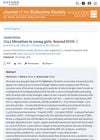 1 citations,
October 2013 in “Actas Dermo-Sifiliográficas”
1 citations,
October 2013 in “Actas Dermo-Sifiliográficas” Customized medications made through compounding can be beneficial for various skin conditions but require careful regulation and collaboration between doctors and pharmacists.
 1 citations,
November 1996 in “Journal of Cutaneous Medicine and Surgery”
1 citations,
November 1996 in “Journal of Cutaneous Medicine and Surgery” Hormones, especially androgens, play a key role in causing acne, and treatments like hormone control pills and hormone-blocking medications can help.

PCOS is a common hormonal disorder with symptoms like irregular periods and excess hair growth, managed with lifestyle changes and medications.
 January 2018 in “Elsevier eBooks”
January 2018 in “Elsevier eBooks” The document concludes that alopecia has various forms, each with specific treatments, but no definitive cure for certain types like CCCA has been proven.
 January 2017 in “Journal of clinical & experimental dermatology research”
January 2017 in “Journal of clinical & experimental dermatology research” The case shows skin changes can indicate deeper health issues like insulin resistance, which are challenging to manage.
 March 2014 in “Fertility and Sterility”
March 2014 in “Fertility and Sterility” The April 2014 issue of "Fertility and Sterility" discussed various reproductive health topics, including hormone therapy benefits, sperm and genetic factors in male infertility, and the link between PCOS and diabetes.
 January 2014 in “European Geriatric Medicine”
January 2014 in “European Geriatric Medicine” A postmenopausal woman's virilization was caused by a rare ovarian tumor that was hard to detect but was successfully treated with surgery.
 January 2019 in “Springer eBooks”
January 2019 in “Springer eBooks” Acne is linked to inflammation and insulin resistance, and is associated with various syndromes that require different treatments.
 October 2024 in “Journal of the Endocrine Society”
October 2024 in “Journal of the Endocrine Society” Hirsutism in young girls can have various causes beyond PCOS, so diagnoses should be reconsidered if treatments don't work.
 January 2023 in “Seven Editora eBooks”
January 2023 in “Seven Editora eBooks” A rare ovarian tumor was diagnosed in a woman from North Brazil, and surgery is the preferred treatment.
 11 citations,
August 2018 in “Endokrynologia Polska”
11 citations,
August 2018 in “Endokrynologia Polska” Polish medical societies recommend personalized treatment for PCOS based on the patient's specific symptoms and use the Rotterdam criteria for diagnosis.
11 citations,
December 2017 in “Journal of the American Academy of Dermatology” The levonorgestrel intrauterine device for heavy periods may cause acne, hair loss, and excess hair growth.
 January 2024 in “Authorea (Authorea)”
January 2024 in “Authorea (Authorea)” STK11 gene polymorphism does not predict metformin response in PCOS.
 November 2023 in “International Journal of Trichology”
November 2023 in “International Journal of Trichology” Trichoscopic features help diagnose and assess female pattern hair loss severity, with inflammation playing a key role.
 2 citations,
May 2023 in “Current Nutrition Reports”
2 citations,
May 2023 in “Current Nutrition Reports” Eating a Mediterranean diet and taking certain supplements may improve symptoms of PCOS.
 1 citations,
April 2022 in “Annals Academy of Medicine Singapore”
1 citations,
April 2022 in “Annals Academy of Medicine Singapore” PCOS care in Singapore can be bettered by refining referral systems, standardizing diagnosis and treatment, enhancing complication screening, and offering educational resources for clinicians.
April 2024 in “Journal of clinical medicine” Classical PCOS types A and B are most common and linked to higher health risks.
 68 citations,
January 2022 in “International Journal of Molecular Sciences”
68 citations,
January 2022 in “International Journal of Molecular Sciences” PCOS management includes lifestyle changes and medications, with ongoing research into repurposed drugs for better treatment options.
 4 citations,
August 2021 in “Clinical and Experimental Reproductive Medicine”
4 citations,
August 2021 in “Clinical and Experimental Reproductive Medicine” The 2018 guideline for PCOS suggests new diagnostic criteria and treatments, but recognizes the need for more research.
 2 citations,
July 2023 in “Frontiers in Endocrinology”
2 citations,
July 2023 in “Frontiers in Endocrinology” The review found that current care models for PCOS are not fully effective and more research is needed, especially in low-income countries.
 1 citations,
January 2023 in “Metabolites”
1 citations,
January 2023 in “Metabolites” Changes in gut bacteria can contribute to the development of Polycystic Ovary Syndrome (PCOS), affecting metabolism, immunity, and causing inflammation. Treatments may involve adjusting these factors.

Mohamed Kandil suggests renaming Polycystic Ovary Syndrome to "Polyfollicular Anovulatory Androgenic Syndrome" to better describe its symptoms, but concerns exist that it may not cover all related issues like obesity and depression.
74 citations,
April 2002 in “PubMed” Both oral contraceptives reduced acne effectively and had similar positive effects on skin oiliness and hair growth.
 15 citations,
April 2019 in “Best Practice & Research Clinical Endocrinology & Metabolism”
15 citations,
April 2019 in “Best Practice & Research Clinical Endocrinology & Metabolism” Polycystic Ovary Syndrome (PCOS) in teenagers is a complex condition linked to genetics and environment, often associated with obesity and insulin resistance, and is treated with lifestyle changes and medication.
 December 2022 in “OBG Management”
December 2022 in “OBG Management” The conclusion is to diagnose PCOS with just hyperandrogenism and irregular periods, and treat with lifestyle changes and basic medications.
 400 citations,
January 2014 in “British Journal of Sports Medicine”
400 citations,
January 2014 in “British Journal of Sports Medicine” The consensus provided guidelines for treating the Female Athlete Triad and a system to decide when athletes can return to sports.
42 citations,
May 2009 in “Contraception” The oral contraceptive with ethinyl estradiol and chlormadinone acetate is effective in treating moderate acne.
 36 citations,
October 2021 in “Frontiers in Endocrinology”
36 citations,
October 2021 in “Frontiers in Endocrinology” Insulin resistance and high male hormone levels are major causes of Polycystic Ovary Syndrome.
 19 citations,
March 2022 in “International Journal of Environmental Research and Public Health”
19 citations,
March 2022 in “International Journal of Environmental Research and Public Health” Certain brain hormones and chemicals are linked to the development of Polycystic Ovary Syndrome.
5 citations,
July 2020 in “PubMed” Both oral contraceptives reduced hirsutism in PCOS patients, but adding metformin showed no extra benefit.

























